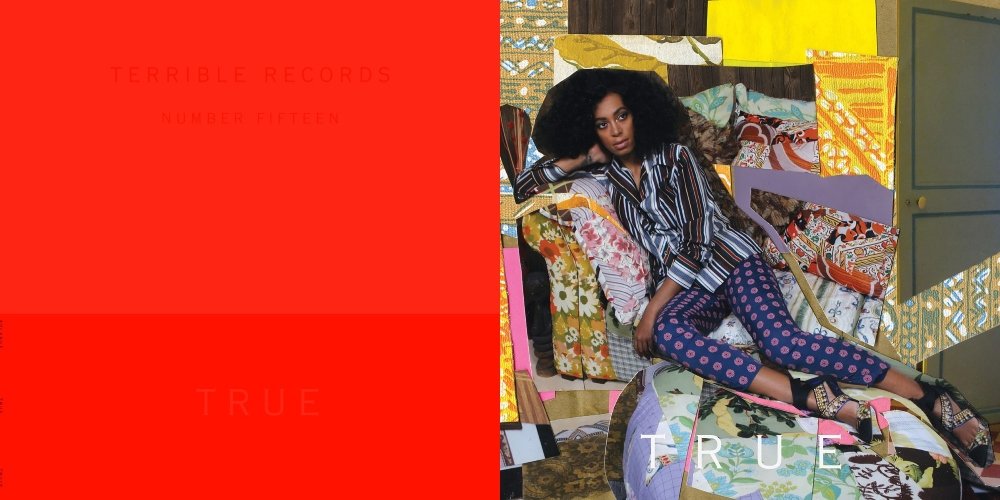Happy 10th Anniversary to Solange’s True EP, originally released November 27, 2012.
Psychology books are full of ideas and theories about the importance of birth order in defining children's characteristics and attitudes. Those ideas are repeated ad infinitum by people the world over, often accompanied with an eye roll of exasperation when the middle child has done something less than desirable (there’s nothing wrong with middle children—leave us alone).
Most of those studies appear to agree that the second child can be more independent and open to acts of rebelliousness. Of course, each family has its own unique circumstances and may work to offset these traditional notions, but these broad psychological ideas can help us understand the dynamics of personal choices in certain instances.
The evolution of Solange Knowles is an astonishing example of what is possible with a surging independent spirit and a healthy rebellious streak against the status quo. Of course, that status quo is the continued sexualization and limitation of possibility for Black women within the racist, sexist framework of American society in general and the record industry, specifically.
The first phase of Solange’s career saw her adopt a framework for success that was well worn for Black women, taking in well-known collaborators to create a version of girl group magic that had brought others success in the 1960s and following decades. Her next phase, however, saw her take a road less travelled as she found a relationship that helped power her True EP from 2012.
That relationship was sparked by Theophilus London introducing Solange to Dev Hynes, the young Londoner better known (at that point) as Lightspeed Champion. The relationship blossomed over playlists that covered Chaka Khan, Jimmy Jay (a French hip-hop artist) and Jam & Lewis records, and Solange decided that he was the person she wanted to help shape her next release. That release would also come via an independent label, as she sought to find a space that represented her best.
Released in the aftermath of The Weeknd’s trilogy and the beginning of a new iteration of soul music, True offered up a response based in those early 1980s records that she and Hynes had bonded over. But the combination of them together offered warmth and beauty where others only gave a cold nihilism.
This warmth and beauty was demonstrated perfectly by the lead single “Losing You” and its accompanying video, which was filmed in Langa township in Cape Town and features a carefree Solange living her best life for a day. Freewheeling on bicycles, swimming in the pool and hanging out with La Sape (Society for the Advancement of People of Elegance) in their impeccably tailored, unceasingly stylish outfits of resistance to colonialism. Where others may have carefully choreographed routines and danced to catch the male gaze, Solange dances for no one but herself, throwing shapes with style, wit and reckless abandon for whatever anyone else thinks.
The song itself is nothing short of fabulous—the tension created between the bubbling synth lines, the edited yelp, the euphoric handclaps and the lyrics that detail the end of a relationship is revelatory and eternally hip-shaking and shoulder shimmying.
As the EP continues, the theme of relationships ending is recurrent. Inspired by Hynes’ recent personal heartbreak but tapped into by Solange to glorious effect, it is a series of electro pop numbers that groove as much as they provide solace from loves lost. “Some Things Never Seem To Fucking Work” with its reverb heavy handclaps and delicate keyboard melody, is replete with indifference and dissatisfaction as the title perfectly encapsulates. It also offers Solange the chance to perfect the layering of her beautiful zephyr light backing vocals.
Alongside the sparse synth drum patterns and winning keyboard lines, the quality of Solange’s vocals is the major success of the EP. Though others may be imbued with more obviously powerful vocal qualities, Solange has a subtle, delicate power best exemplified by the runs she hits on the Verdine White aided “Bad Girls (Verdine Version)”—she has an angelic touch that lights up proceedings throughout.
While the seeds of her sound were present on previous releases, here she embraces the best qualities of her voice fully and begins the approach that marked future efforts, the fabulous A Seat At The Table (2016) and When I Get Home (2019). While Sol-Angel and The Hadley Street Dreams (2008) was a highly proficient and mature piece of work for someone so young, True marks a change in both musical direction and approach to her voice. It is an intriguing step along the journey of the artist who now lists ballet composer among her achievements and it remains one of my favorite projects of that decade.
In writing about True, it would be remiss not to mention the sad disintegration of the relationship between Knowles and Hynes that occurred in the aftermath of its release in the public eye on Twitter, with both feeling they weren’t given their due in its creation. However, the seeds of that miscommunication lie in the way the project was approached by others. As a Black woman, Solange was cursed by the limitations others placed on her—how could she, a young Black woman with a famous surname have created something so impactful? While Hynes was a young Black man from the UK—how could he have contributed to a project alongside a member of a family dowsed in pop superstardom?
Enjoying this article? Click/tap on the album covers to explore more about Solange:
Irrespective of the fallout, the relationship was later repaired and it marked the cementing of Solange’s independent pathway and desire to be things other than what might be expected of her by others, as demonstrated by the magnificent A Seat At The Table four years later. For Hynes, his own album under the Blood Orange moniker entitled Cupid Deluxe was released the following year (2013) and it was a critical success that had echoes of this work throughout.
LISTEN:



